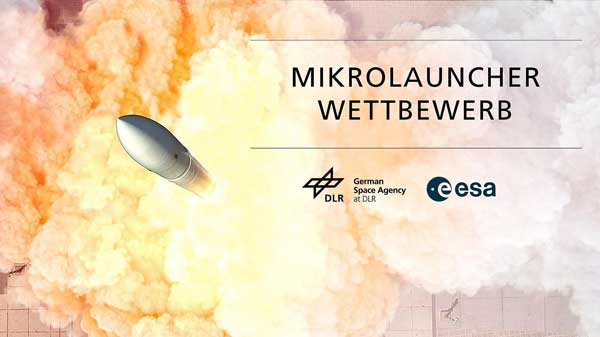
- On June 20, 2022, the German Space Agency at DLR started the second round of the competition for small satellites to fly on micro-launchers developed and built in Germany.
- The competition is aimed not only at European institutions, but also at start-ups and small and medium-sized enterprises.
- A total of three more flights will be offered by the space companies Isar Aerospace Technologies GmbH and Rocket Factory Augsburg AG in 2023 and 2024.
- Focus: space travel, commercialization, start-up funding
COLOGNE, Germany (DLR PR) — On June 20, 2022, the German Space Agency started the second round of the competition at DLR for a free flight of small satellites on micro-launchers developed and built in Germany. This marks the beginning of the application phase for a total of three further flights, which will be offered by the space companies Isar Aerospace Technologies GmbH and Rocket Factory Augsburg AG in 2023 and 2024. This time, the competition is aimed not only at European institutions, but also at start-ups and small and medium-sized enterprises.
“The payload competition is an important element in the German government’s small satellite strategy and a further step towards strengthening the small satellite segment in European space travel,” explains Dr. Walther Pelzer, Member of the DLR Executive Board and Head of the German Space Agency at DLR. “In addition to funding the German launch service providers, we are now offering institutions and companies an attractive opportunity to test their small satellite technologies in space and carry out scientific experiments.”
Up to 150 kilograms of mass can be launched per flight
The opportunities to fly are ideal for small satellites that are to carry out scientific or commercial missions or test new technologies in space. A total mass of up to 150 kilograms can be launched on each of the three flights. This allows the flight of several small satellites, since each of them has only a low weight. “The applications are evaluated by a five-person expert jury from DLR according to the competition criteria,” explains Markus Wagener, head of the small satellites department at the German Space Agency at DLR. “These include the scientific and technological uniqueness, the development status of the satellite or the potential of the experiments on board for applications on earth.”
The application deadline for the two flights in 2023 is October 15, 2022, and the winners will be announced by November 30, 2022. For the flight in 2024 there is an extended application period until April 30, 2023, the selection of the winners is planned until June 30, 2023.
The first round of the payload competition took place in 2021. Five institutions from Germany, Norway and Slovenia were able to assert themselves with a total of seven small satellites.
Small satellite ride-along opportunity is part of the micro-launcher competition
The payload competition is embedded in the micro-launcher competition that the German Space Agency has been organizing at DLR since 2020 as part of the Boost! program of the European Space Agency ESA. The aim of this program is to promote the commercialization of European space travel and to improve the autonomy and competitiveness of companies and research institutes, especially in the area of smaller payloads.
The German start-ups Isar Aerospace Technologies GmbH (Spectrum carrier rocket) , Rocket Factory Augsburg AG (RFA One) and HyImpulse Technologies GmbH (SL1) were able to assert themselves in various phases of the microlauncher competition. The two rockets Spectrum and RFA One were chosen to carry out the four missions. With a length of only 28 or 30 meters and a diameter of two meters, they are designed to transport payloads weighing up to 1.5 tons and are therefore ideal for launching small satellites.

